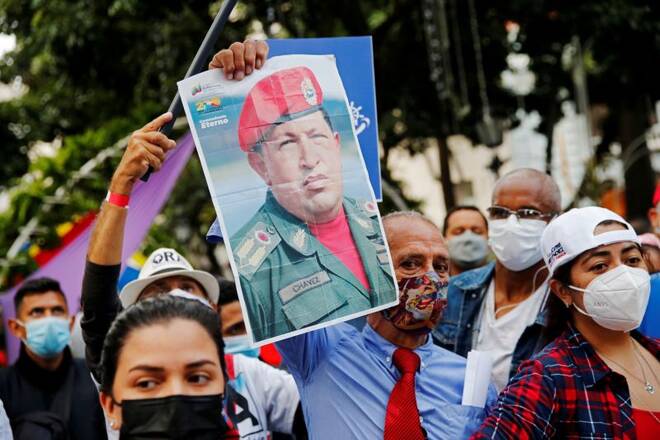Advertisement
Advertisement
Venezuela’s Socialists risk losing power in late leader’s home state
By:
CARACAS (Reuters) - Venezuelans on Thursday were awaiting election results from former President Hugo Chavez's home state, a stronghold for the ruling Socialist Party, four days after millions of people cast ballots in regional contests across the South American nation.
CARACAS (Reuters) – Venezuelans on Thursday were awaiting election results from former President Hugo Chavez’s home state, a stronghold for the ruling Socialist Party, four days after millions of people cast ballots in regional contests across the South American nation.
President Nicolas Maduro’s Socialists won 19 of the 23 governorships in Sunday’s vote, with the opposition taking three, according to a tally provided by the National Electoral Council on Monday.
The one holdout is the state of Barinas in western Venezuela where Argenis Chavez, the current governor and brother of the late Venezuelan leader, is running for re-election as a Socialist. Hugo Chavez, who died in 2013, was from the state.
Freddy Superlano, a member of opposition leader Juan Guaido’s party, says he is confident the results, when released, will show that he was won the race. He bases that claim on vote tally sheets, the vast majority of which have been scrutinized.
A Superlano victory in Barinas would be largely symbolic, as it would leave the opposition with four governorships, the same number it held before the elections.
The delayed results also could place the country’s new electoral council under a microscope. The government agreed in May to allow two opposition officials on the five-member council. The council did not respond to request for comment.
The United States and many other Western powers have refused to recognize Maduro as the legitimate president of Venezuela since he was declared the winner of a 2018 election that was described as fraudulent by Washington, the European Union and many of Venezuela’s neighbors.
The EU’s electoral observation mission is in Barinas, said Isabel Santos, the head of the mission. Earlier this week, she said the regional elections in Venezuela were held under better conditions than those of previous contests, but declined to say whether the vote was free and fair.
She added that the mission’s final report would be delivered at the end of January or in early February.
Diosdado Cabello, vice president of Venezuela’s Socialist Party, has harshly criticized the EU mission.
“They (observers) say they come in January, how is it that you think you can come to Venezuela when you want? No, my friend, that’s not the case!” Cabello said on Wednesday.
(Reporting by Vivian Sequera, Mayela Armas y Deisy Buitrago; Writing by Sarah Kinosian; Editing by Paul Simao)
About the Author
Reuterscontributor
Reuters, the news and media division of Thomson Reuters, is the world’s largest international multimedia news provider reaching more than one billion people every day. Reuters provides trusted business, financial, national, and international news to professionals via Thomson Reuters desktops, the world's media organizations, and directly to consumers at Reuters.com and via Reuters TV. Learn more about Thomson Reuters products:
Advertisement
